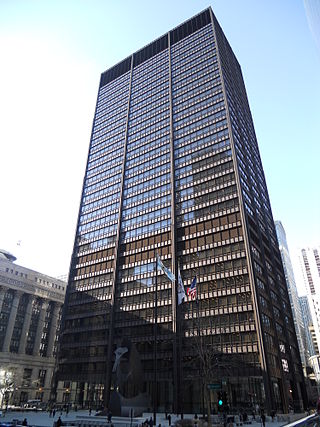Court of Common Pleas
The Court of Common Pleas is led by a President Judge and Administrative Judges, Common Pleas is further broken down into three divisions: trial, family and orphans' court division.
As of November 2023, the President Judge of the Court of Common Pleas is the Honorable Nina Wright-Padilla, [1] and as of January 16, 2024, the current Administrative Judge is the Honorable Daniel J. Anders, having previously served as the civil division's supervising judge. [2] There are 70 commissioned judges in the trial division, supplemented by senior judges. Of the commissioned judges, 41 sit in the criminal section of trial division and 29 sit in the civil section of the trial division. [3] The civil and criminal sections each have their own supervising judges, including a separate supervising judge for the civil division's Commerce Case Management Program. As of January 16, 2024, the Commerce Program's Supervising Judge is the Honorable Abbe F. Fletman, [4] and the Criminal Division Supervising Judge is the Honorable Rose Marie Defino-Nastasi as of June 14, 2023. [5]
The family division is broken down into the Juvenile Branch and Domestic Relations, and has 25 assigned judges. [6] The family division has its own Administrative Judge and Supervising Judge (being the Honorable Margaret T. Murphy and the Honorable Walter J. Olszewksi as of March 2019). As of March 2019, there are four judges assigned to the Orphan's Court Division, including its own Administrative Judge (the Honorable Matthew D. Carrafiello). [7]
Through a 1999 Order of then Administrative Judge John W. Herron, the Commerce Case Management Program was created within the trial division's civil section, effective January 1, 2000. [8] [9] The program is generally known as the Commerce Court. It is a specialized Business Court hearing only business and commercial cases that fall within specifically defined categories. [10] Judge Albert W. Sheppard Jr. served along with Judge Herron as the first two Commerce Court judges. [11] There are three assigned civil section judges who exclusively hear Commerce Court cases, one of whom serves as the Commerce Court's Supervising Judge (the Honorable Abbe F. Fletman as of May 2024 [12] ). The Commerce Court provides "Advice to Counsel" and Supervising Judge Fletman has posted her Courtroom Procedures. [13] The Commerce Court has three case tracks: (1) Expedited (trial in 13 months); (2) Standard (trial in 18 months); and Complex (trial in 24 months). [14]
Since the Commerce Court's inception, its design has required that opposing counsel, and often the litigants themselves, participate in mandatory settlement conferences facilitated by Judges Pro Tempore (JPTs). These JPTs are not judges, but seasoned commercial and business lawyers with training or experience as mediators and neutrals. [15] JPTs are designated by the Commerce Program Supervising Judge. The JPT pool consists of volunteers "nominated by the Philadelphia Bar Association Business Law Section, Business Litigation Committee (“Committee”) and/or the Court, and recommended by the Committee." To qualify as a JPT, one must be a licensed attorney, "with no less than fifteen (15) years of experience in litigation or alternate dispute resolution (ADR), including a practice focused on the types of disputes" over which the Commerce Court has jurisdiction. JPTs must also have at least 10 hours of ADR training "or shall have participated as a neutral, JPT, or mediator in a minimum of 3 ADR proceedings, including but not limited to mediations, settlement conferences and private arbitrations, involving" actions of a nature falling in the Commerce Courts jurisdiction. [16]
In 2005, the Committee of Seventy produced a study on the Commerce Court. [17] The Philadelphia Bar Association, and the Business Litigation Committee within its Business Law Section, have been involved with the creation and development of the Commerce Court since before its inception. [18] [19] [20]
The Commerce Court has also posted over 1,000 judicial opinions on its website since 2000. [21] In providing guidance to litigants and their lawyers, the Commerce Court makes these opinions searchable by topic as well. [22]
The trial division holds all criminal proceedings, as well as proceedings for civil matters where more than $10,000 is being challenged. The family division is discharged with resolving domestic relations and juvenile cases. The orphans' court is responsible for processing and resolving disputes of, trusts, wills, and estates. The Adult probation and parole services for Philadelphia are under the jurisdiction of the Common Pleas court. The Intake and Interstate Units are located in the Basement of the Criminal Justice Center, while all other units are located at 714 Market Street.
Criminal dockets would be CP-51-CR-*****-2007. CP denotes the court, in this case, Common Pleas. 51 is the county code, in this case Philadelphia County. CR denotes the type of case, criminal. The * represents the case number and the last four digits are the year the case was created.
Municipal Court
All criminal cases in Philadelphia initially go through Philadelphia Municipal Court, with 27 judges. The Municipal Court maintains jurisdiction over criminal cases where the maximum punishment possible for an offender is less than five years imprisonment. The Municipal Court's traffic division handles all traffic court matters arising within City limits. The Municipal Court also has jurisdiction over civil cases with an amount in controversy less than $12,000 (or $12,500 for fines and most debts owed to the City of Philadelphia, or $15,000 for delinquent real-estate taxes owed to the City and certain tax debts owed to the School District of Philadelphia). The civil division of the Municipal Court also has jurisdiction over all landlord-tenant disputes, residential or commercial, irrespective of the amount in controversy.
Appeals from the Municipal Court remain within the First Judicial District by becoming a matter of the Court of Common Pleas. Philadelphia is one of two counties in Pennsylvania that has a Municipal Court (the other being Pittsburgh). Criminal dockets would be MC-51-CR-*****-2007.
Summary offenses are heard in Community Court, the usual punishment from a summary offense is a small fine and/or community service. The summary dockets would be MC-51-SU-*****-2007.







